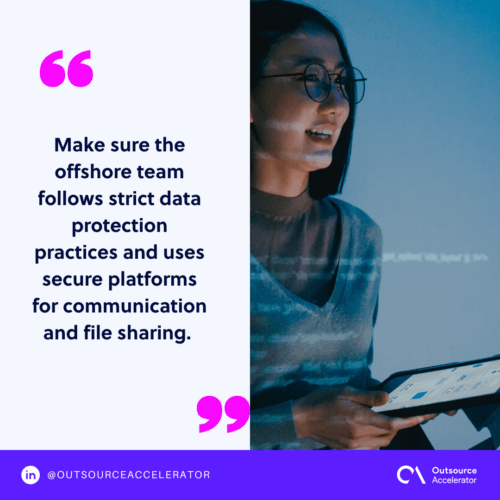6 important considerations before hiring offshore software developers

Finding and keeping skilled in-house software developers is a growing challenge for many businesses. Local talent often comes at a high cost, hiring takes time, and team bandwidth gets stretched thin, slowing down innovation and delivery.
To move faster and scale better, a lot of companies are turning to offshore software developers. These remote experts offer flexibility, fresh perspectives, and access to specialized skills that may be hard to find locally.
When done right, this model supports growth while reducing overhead and improving output. But before jumping in, it’s important to make the right choices to avoid common pitfalls.
This article breaks down six vital considerations to help you build a strong, productive relationship with offshore software developers and maximize the value they bring to your business.
What offshore software developers can do
Offshore software developers bring more to the table than just coding skills. They help businesses innovate confidently and stay a step ahead in a tech-driven world.

Their expertise spans a wide range of functions that support every stage of software development, such as:
Custom software development
Offshore developers build tailored software solutions based on a company’s specific goals and workflows. Whether it’s a mobile app, enterprise platform, or SaaS product, they turn ideas into scalable digital tools.
Web and mobile app development
They design, code, and test responsive applications that deliver seamless user experiences across devices. Their knowledge of frameworks, programming languages, and platforms helps businesses reach wider audiences.
Software testing and QA
Quality matters. Offshore teams handle both automated and manual testing to detect bugs, improve performance, and strengthen product reliability before launch.
System maintenance and updates
Once a product goes live, offshore developers step in to monitor performance, fix issues, and apply regular updates. This keeps software secure, fast, and compatible with changing technologies.
Tech stack consulting
Offshore specialists offer guidance on choosing the right tools, platforms, and frameworks. Their insights help companies make strategic technical decisions early in the process.
Offshore software developers are vital in driving growth through efficient tech solutions. Their skills cover far more than development as they deliver the support businesses need to build, launch, and evolve.
6 considerations before choosing offshore software developers
Partnering with the wrong third-party solutions provider may lead to delays, miscommunication, or underwhelming results. To avoid setbacks and build a strong offshore team, organizations need to weigh these six important factors first:
1. Technical expertise and specialization
Not all developers have the same skill set. Look for offshore teams with proven experience in the technologies, programming languages, and platforms that match your project.
This alignment helps avoid potential delays and rework, saving you time and money. Check their portfolio, past clients, and case studies to gauge their capabilities.
2. Communication and collaboration
Clear, consistent communication is the solution to project success. Hire developers who speak your language well, understand your goals, and can collaborate effectively across time zones.
Ask about their preferred tools for updates, meetings, and task management.
3. Project management approach
A structured workflow keeps projects on track. Evaluate whether the team follows agile, scrum, or another project management style, and how that aligns with your internal processes.
Strong leadership and transparency can make or break a development cycle.
4. Time zone and availability
Time zone differences can work in your favor or cause major delays. Consider how often you’ll need real-time collaboration and whether the offshore team can align at critical points of the day.
Finding a team with a reasonable time zone overlap helps to improve communication and speed up problem-solving.
5. Security and data handling
Software projects often involve sensitive data. Make sure the offshore team follows strict data protection practices and uses secure platforms for communication and file sharing.
Make sure to ask about past compliance with industry standards or regulations.

6. Long-term support and scalability
Software development doesn’t end at launch. Choose a partner who offers ongoing maintenance, upgrades, and support.
If your business grows or needs change, the offshore team should be ready to scale along with you.
Selecting the right offshore software developers takes more than scanning résumés. A thoughtful approach to these six factors helps build a productive partnership, one that supports your goals and delivers real results.
Offshore software developers seamlessly with ConnectOS
ConnectOS uses integrated resourcing to help businesses build high-performing development teams without the usual stress and delays.
Their offshore software developers bring the right mix of skill, speed, and flexibility to drive real progress, whether you’re launching a product or scaling fast.
With a proven process and hands-on support, ConnectOS makes offshoring feel like an extension of your in-house team.
Start the conversation today and discover what your business can build next.







 Independent
Independent




